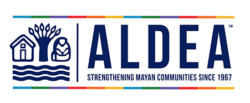
In the Kaqchikel language, “Xiquin Juyú” means “at the edge of the hill.” The community is located about 4.5 miles east of the municipal seat of Tecpán. The village is home to 140 families, about 870 people. It was founded in 1996, when community members separated from a larger community called Xenimajuyú. About 75 percent of the families are Catholic, 20 percent are Charismatic Christian, and 5 percent attend other churches outside the village.
The community’s main productive activity is agriculture, especially corn, beans, strawberries, potatoes, cabbage, cauliflower and broccoli. Some people also work for larger farms, where men are paid $6 per day for their labor and women receive $4.50.
Xiquin Juyú has a primary school serving 190 children from kindergarten through sixth grade. There is not a health post in the community, but a nurse visits once per week to provide vaccinations to children. Eighty percent of families have electricity in their homes, and 75 percent of the roads are dirt.
Our Partnership:
ALDEA and ABPD began working with 98 Xiquin Juyú families in July 2019 that completed our integrated program in May 2023. Click here to learn more about how we work with our partner communities and visit our blog to stay up to date with the latest developments on the ground in Guatemala!
